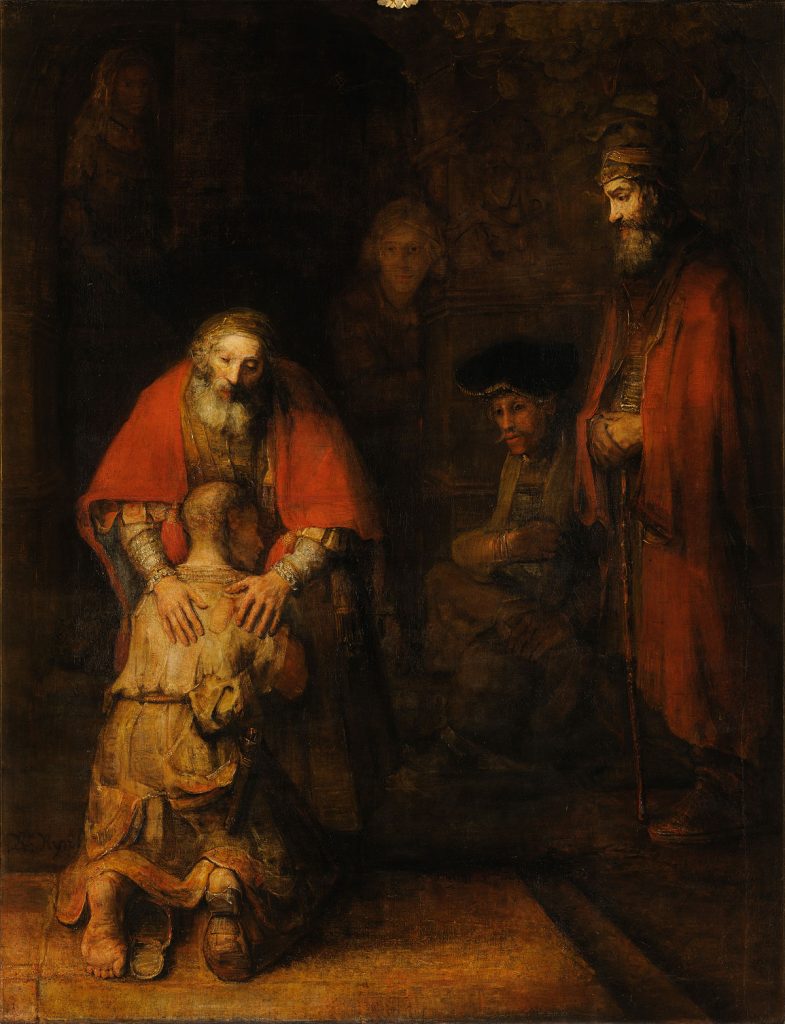This week we will be discussing the older son as set forth in Luke 15:25-30. Please read Part II (chapters 4-6) of The Return of the Prodigal Son: A Story of Homecoming and Chapter 5 of The Cross & the Prodigal (pp.78-89). Before going into the readings, please take the time to study Rembrandt’s representation of the older son in the painting. Look at how Rembrandt portrays the older son in dress, expression, and body language. And within that painting compare this presentation of the older son with the other two main characters.
In his discussion, Fr. Nouwen brings out that the older son has also gone out and is returning. By all outward appearances, the older son is blameless, for he has gone out to the work required of him by his Father. But, upon his return, when he is confronted with the father’s grace towards his brother, the older son erupts as a resentful, proud, and selfish person. Nouwen calls this the frozen anger among the saints. p.75. It is this anger that we have towards those who aren’t good Christians, but yet have a place in the Kingdom. Within this frozen anger, all joy is lost. This anger develops into a “pathology of darkness” from which the older brother cannot escape. p.82. Therefore, in many ways, the younger son, even in the pigsty, is freer and understands the father’s love better than the obedient son ever has. Unlike the younger son’s return, Jesus never resolves the older son’s return. Jesus never tells us whether the older son ever even enters his father’s house again.
As you study the writings this week, think through how you are the older son. We all have the tendency, like the older son or the Pharisees, to define our relationship with God as a legal transaction. What sources of resentment and anger do you hold towards God’s grace and the people he bestows it upon? Are there parts of your spiritual life that are still dark and joyless because of the unfairness of the Father’s grace?
(As an aside, in my morning readings I came across Luther’s Sermon on How Christians Should Regard Moses. Although the sermon doesn’t touch on the Parable, it does provide Luther’s answer to those of us, who like the elder son and the Pharisees, may respond to the Father’s grace by asking if all we need is grace, then why should we even read our Bibles.)
Dinner is at 6. The menu is baked potato bar. Discussion about 6:45. Hope to see you here and bring a friend.
He also told this parable to some who trusted in themselves that they were righteous and despised others: “Two men went up into the temple to pray, one a Pharisee and the other a tax collector. The Pharisee stood and prayed thus with himself, ‘God, I thank thee that I am not like other men, extortioners, unjust, adulterers, or even like this tax collector. I fast twice a week, I give tithes of all that I get.’ But the tax collector, standing far off, would not even lift up his eyes to heaven, but beat his breast, saying, ‘God, be merciful to me a sinner!’ I tell you, this man went down to his house justified rather than the other; for every one who exalts himself will be humbled, but he who humbles himself will be exalted.”
Luke 18:9-14

